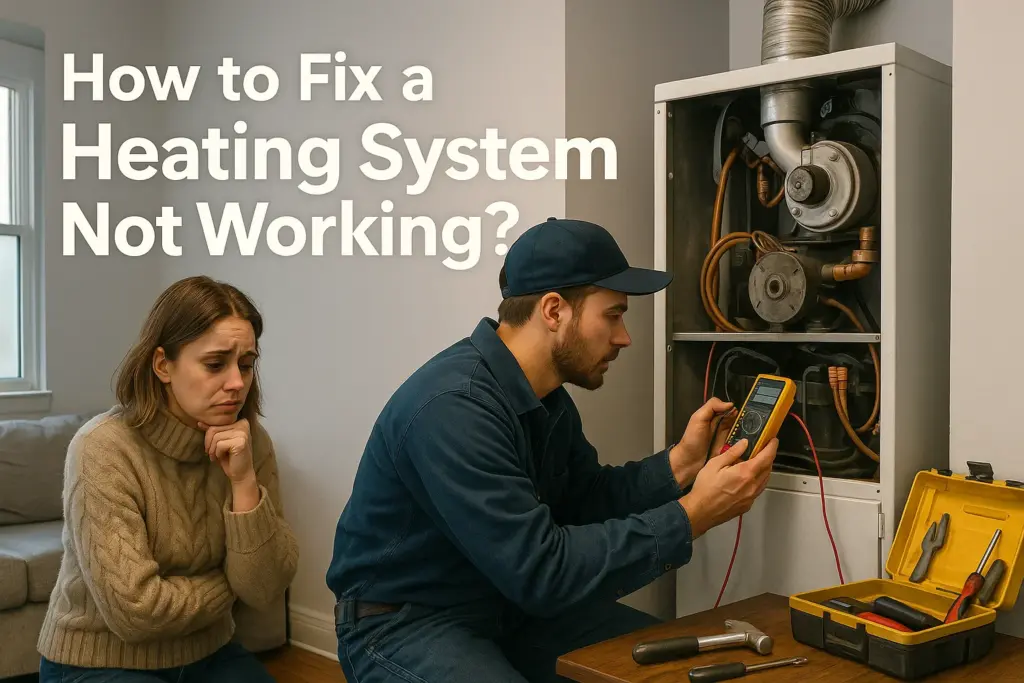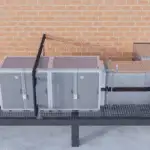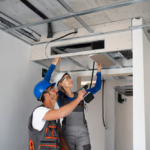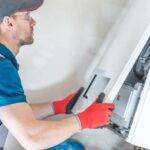When it gets cold, a malfunctioning heating system makes your home uncomfortable. If your heating system won’t turn on, you might feel frustrated and worried about your home’s safety and comfort.
You might wonder, “What’s wrong with my heating system, and how can I fix it?” Finding out what’s causing the problem is the first step to solving it. It could be a simple fix or a more complex issue, but knowing the problem is key.
Key Takeaways
- Common causes of heating system failure
- Simple troubleshooting steps to try at home
- When to call a professional for assistance
- Tips for maintaining your heating system
- How to prepare for future heating system issues
Understanding Your Heating System
Knowing how your heating system works is key to a cozy home. It keeps your home warm when it’s cold outside. Understanding it helps you fix problems and keep it running well.
Types of Home Heating Systems
There are many heating systems out there. You might have a forced-air system, a boiler, or a heat pump. Forced-air systems blow warm air through ducts. Boilers warm water or steam for heat. Heat pumps move heat from outside to inside.
How Heating Systems Function
Heating systems make heat and spread it around your home. They use a thermostat to control the temperature. The heating unit (like a furnace) makes the heat. And a distribution system (like ducts) carries it to every room.
Tools You’ll Need for Basic Repairs
For simple fixes, you’ll need a screwdriver, pliers, and a multimeter. These tools help with basic upkeep and finding issues.
Common Reasons Why Heating Systems Stop Working
Knowing why heating systems fail is key to fixing them. It’s frustrating when your heating stops working, more so in cold weather. Finding the cause is the first step to fixing it.
Many things can make a heating system fail. Problems with the thermostat, power issues, fuel problems, and airflow issues are common. Let’s look at these issues and how to fix them quickly.
Thermostat Issues and Quick Fixes
A bad thermostat can stop your heating from working. Make sure your thermostat is set right and in the right mode. If it’s programmable, check the settings. Try replacing batteries or cleaning it if dust is a problem.
Power Supply Problems
Power issues can also stop your heating. Check your circuit breaker or fuse box. Make sure it hasn’t tripped or blown. If you have a gas system, check the gas supply is on.
Fuel Supply Issues
Fuel problems, like with oil or propane systems, can also fail your heating. Check your fuel levels and the supply line. Make sure it’s not blocked or kinked.
Airflow Restrictions and Filter Problems
Dirty or clogged filters can hurt your heating system’s performance. Regularly check and replace your filters. Also, make sure vents and registers are clear of furniture or other things.
By tackling these common problems, you can often get your heating system working again. But if it doesn’t work, you might need a pro HVAC technician’s help.
How to Fix a Heating System Not Working? Step-by-Step Guide
Before you start fixing your heating system, it’s key to know the steps involved. Fixing a heating system that’s not working can be easy when broken down. Here’s a step-by-step guide to help you troubleshoot and possibly fix your heating system.
Safety Precautions Before You Begin
First, turn off the power to your heating system at the circuit breaker or fuse box. Wear gloves and safety glasses for protection. If you’re not sure about anything, it’s best to get a professional.
Checking and Resetting Circuit Breakers
A tripped circuit breaker or blown fuse can stop your heating system. Check your circuit breaker box. If you find a tripped breaker, reset it. But if it trips again, there might be a bigger electrical problem that needs a pro.
Inspecting and Testing Your Thermostat
Your thermostat controls your heating system. Make sure it’s set right and working. Try changing the temperature to see if it works. If not, you might need a new thermostat or to check the wiring.
Examining Fuel Supply and Connections
If your heating system uses fuel, like natural gas or oil, check the supply. Make sure the fuel levels are good and the connections are secure. Leaks or empty tanks can cause problems.
When to Call a Professional Immediately
Some issues need a pro right away, like gas leaks, electrical problems, or if DIY repairs make you uncomfortable. Knowing when to ask for help is important for your safety and the system’s health.
Fixing Specific Heating System Components
Fixing specific parts of your heating system can save you time and money. Often, heating system failures stem from problems with key components. Knowing how to diagnose and fix these parts can help your system work efficiently again.
Furnace Troubleshooting and Repairs
Your furnace is a key part of your heating system. Common issues include ignition problems, faulty sensors, and clogged filters. Start by checking the power supply and the circuit breaker. Then, look at the igniter and burner for blockages or damage.
If you find a problem, you might need to clean or replace the faulty part.
Boiler System Solutions
Boilers can be complex, with issues like leaks, pressure problems, or faulty thermostats. First, check the pressure gauge; if it’s too low, you may need to repressurize the system. Look for signs of leaks around the boiler and pipes.
If you suspect a leak, it’s best to consult a professional to avoid further damage.
Heat Pump Diagnosis and Fixes
Heat pumps can have issues like frozen coils, faulty defrost cycles, or refrigerant leaks. Check the outdoor unit for ice buildup and ensure the defrost cycle is working. If your heat pump is not blowing warm air, it might be due to a refrigerant leak, which requires professional attention.
Addressing Ductwork and Radiator Problems
Ductwork and radiators are key for distributing heat in your home. Issues can include leaks in the ducts or airlocks in radiators. For ductwork, look for gaps or damage and seal them to improve efficiency.
For radiators, bleeding the system can solve airlock issues. If a radiator is not heating evenly, try bleeding the radiator to remove trapped air.
By addressing these specific components and following the troubleshooting steps, you can often resolve common heating system issues. But if you’re unsure or if the problem persists, it’s always best to consult a heating professional. This ensures your system is safe and efficient.
Preventative Maintenance to Avoid Future Heating Problems
Keeping your heating system in top shape is key. This ensures it works well, safely, and lasts longer. Regular checks help avoid sudden breakdowns, cut down energy costs, and extend your system’s life.
Monthly Maintenance Tasks
For a smooth-running heating system, monthly tasks are essential. Start by checking and swapping out air filters. Dirty filters make your system work harder, using more energy and wearing out faster. Also, make sure the area around your heating system is clean and free of dust.
Seasonal Maintenance Checklist
Seasonal checks are vital for your heating system’s health and efficiency. Before the cold weather hits, look over your system’s electrical connections. Check for any damage or wear on ducts and pipes. Don’t forget to test your thermostat and consider a professional tune-up.
Professional Service Recommendations
While you can do some maintenance yourself, there are times to call a pro. If you’re not sure about certain repairs or your system is old, get expert help. Professionals can give your system a deep clean and tune-up. They can also suggest upgrades or replacements if needed.
Conclusion
You now know how to fix a heating system that’s not working. You can spot problems like thermostat issues, power cuts, and blocked airflow. This helps you fix heating system failures.
Regular maintenance is essential to avoid heating problems. Doing monthly and seasonal checks keeps your system running well. This makes your home warm and cozy, even in cold weather.
Knowing your heating system and keeping it in good shape saves you from breakdowns and expensive fixes. Follow the tips in this article to have a reliable and efficient heating system.
FAQ
Why is my heating system not turning on?
Your heating system might not work if the thermostat, power, or fuel supply is off. Check these areas first. Make sure your thermostat is set right, your circuit breakers are on, and you have enough fuel.
How do I troubleshoot my heating system?
Start by looking at the thermostat, circuit breakers, and fuel levels. Also, check the filters, ductwork, and connections for damage or issues.
What are some common heating system problems?
Issues like thermostat problems, power or fuel supply issues, and airflow or filter problems are common. Regular maintenance can help avoid these problems.
How often should I maintain my heating system?
You should maintain your heating system monthly and seasonally. This includes changing filters, checking ductwork, and getting professional help when needed.
When should I call a professional to fix my heating system?
Call a professional if you’re not sure how to fix the problem or if it’s complex. They have the skills to handle it.
How can I prevent heating system failure?
Regular maintenance and inspections can prevent failure. Fixing issues quickly also helps. This keeps your system running well for longer.
What are the benefits of regular heating system maintenance?
Maintenance boosts efficiency, lowers energy costs, and extends your system’s life. It also prevents expensive repairs and ensures safe operation.
How do I know if my heating system needs to be replaced?
If your system is old, not efficient, or breaks down often, it might need replacing. A professional can check your system and advise on the best option.




